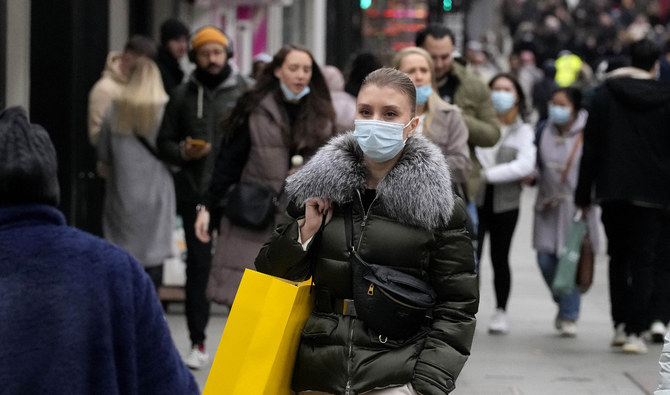
- ARAB NEWS
- 12 Jul 2025

In October 2020, with the pandemic still to reach its peak and vaccines not yet available, the writer and CNN host Fareed Zakaria published “Ten Lessons for a Post-Pandemic World.” Zakaria always looks at the world globally, through numerous lenses, and distills emerging trends in simple and clear terms.
What did he learn from the early phase of the pandemic and see in his crystal ball about the newly emerging world? First, he stressed the importance of good, effective, competent governance, learning an important lesson from the early US mishandling of the pandemic. He warned that on all kinds of challenges, unless we listen to the experts, adopt evidence-based policies (not politics), and coordinate with the rest of the world, we will suffer major socio-economic consequences. Second, he stressed that we must fight against inequality and poverty (the pandemic showed us how rich – and often selfish – nations can cope with disasters while poor ones will suffer doubly), and use digital infrastructure to mitigate sudden socio-economic freezes.
Those lessons, and others that Zakaria distills in his book, are still valid. But what else can we see on the horizon while we take steps to come out of the pandemic tunnel – the omicron variant hopefully being just a bump? With an extra year of data and evolving trends, and particularly with the hugely positive and immediate impact of vaccines (in some parts of the world more than in others), is it possible to see some more definite patterns and thus take action to ensure the world goes in the right direction?
This past year, digital communication and social networks came to the forefront of our worries — that our personal and social lives were being wrecked, by both cyber criminals (some of them directed by states) and greedy companies. We witnessed an explosion of cyberattacks and ransomware strikes. In 2020, 51 percent of businesses surveyed were hit with ransomware; in 2021, companies were expected to be hit every 11 seconds! We also learned of spyware (Pegasus and such) that some governments used against their detractors and political opponents, both fellow citizens and foreigners (journalists, politicians, and others).
In parallel with that, social networks, particularly Facebook and Instagram, were accused of following a “profit driven amorality” with their billions of users by applying algorithms that not only extract personal data and construct psycho-social profiles of them but also (perhaps unwillingly) make them behave in very detrimental ways.
The most worrying trend is perhaps that the pandemic does not seem to have taught us a lesson.
Nidhal Guessoum
It turns out that even if we delete all apps on our smartphones and never log on to a social network from any digital device, we can still be tracked and profiled in “legal” ways (Facebook, Cambridge Analytica, etc.), and spied on (via our smartphone cameras, microphones, typed text, etc.).
What to do? The solution can come only from an international consensus and new norms of digital behavior that must be imposed on companies, governments, and individuals, at the risk of their being turned into international pariahs (penalties ranging from loss of digital access and travel bans to economic sanctions).
Another trend that has accelerated is genetic engineering and biomedical research, on which ethical principles and constraints need to be strictly imposed. Last April, for example, a team of researchers announced that they had grown human-monkey hybrid embryos by injecting monkey embryos with human stem cells; they then watched them develop for 19 days. The researchers justified this “feat” by claiming that the research would help scientists develop better drugs and human organs for transplants. In the meantime, the genetic engineering technique known as CRISPR has become easier, cheaper, and more effective, and is now being applied increasingly widely on plant, animal, and human cells. Do I need to point out the ethical concerns?
Finally, and while the world convened in Glasgow for the COP26 conference on climate change, trying to agree on global solutions to at least slow down the striking effects of the changing climate (heatwaves, wildfires, floods, droughts, and more), other environmental disasters seem to continue unabated and unnoticed.
I am referring to the plastic pollution calamity that we rarely hear about (1.5 billion plastic bottles and 15 billion plastic bags are used every day) and to the destruction of oceans and seas, both by the plastic that is routinely thrown there (80 percent of ocean debris is now plastic) and overfishing, resulting in the disappearance of hundreds of species and the drastic reduction in tuna and other highly sought-after fish.
The most worrying trend is perhaps that the pandemic does not seem to have taught us a lesson. In China, not only are carbon dioxide emissions greater than those of all the OECD countries combined, in 2021 they were also 9 percent higher than their pre-pandemic levels.
We should really consider the pandemic as both an exam, or test, and also a moment to pause and reflect to see where our world is going, and what we must do to avoid irreversible changes and disastrous outcomes. The future is ours to write now.
• Nidhal Guessoum is a professor at the American University of Sharjah, UAE.
Twitter: @NidhalGuessoum.